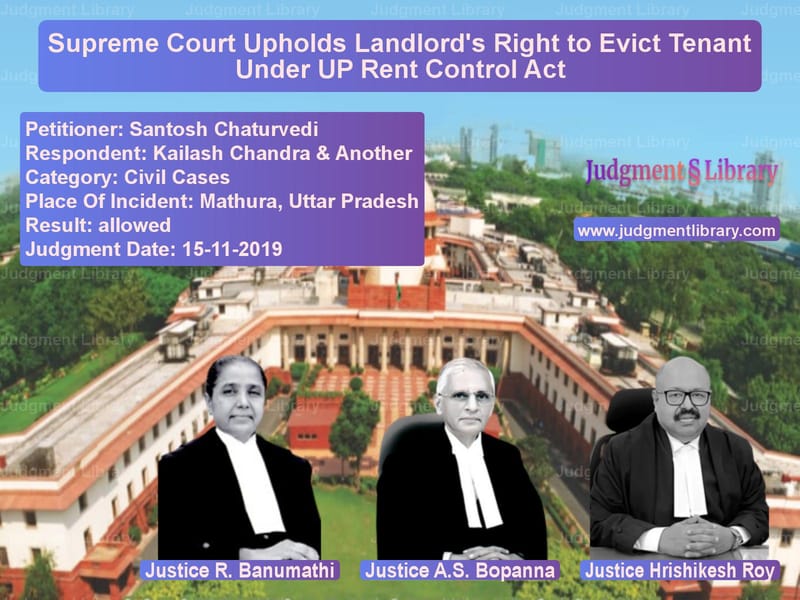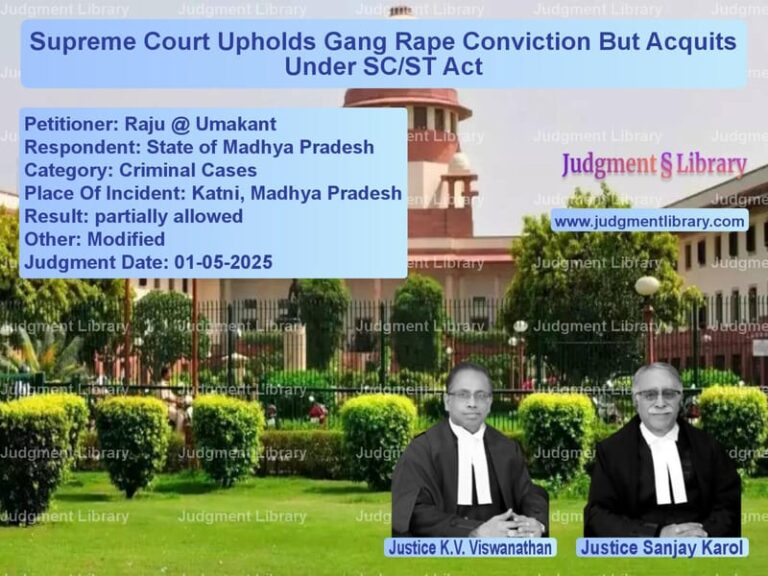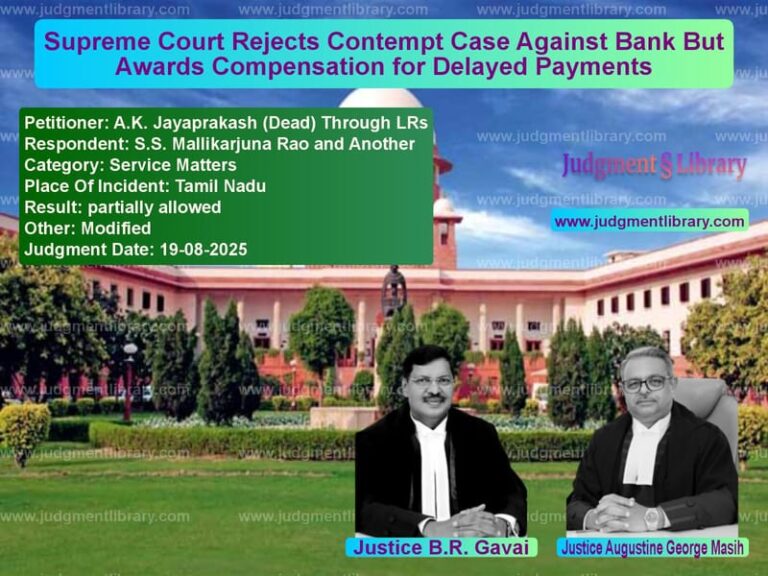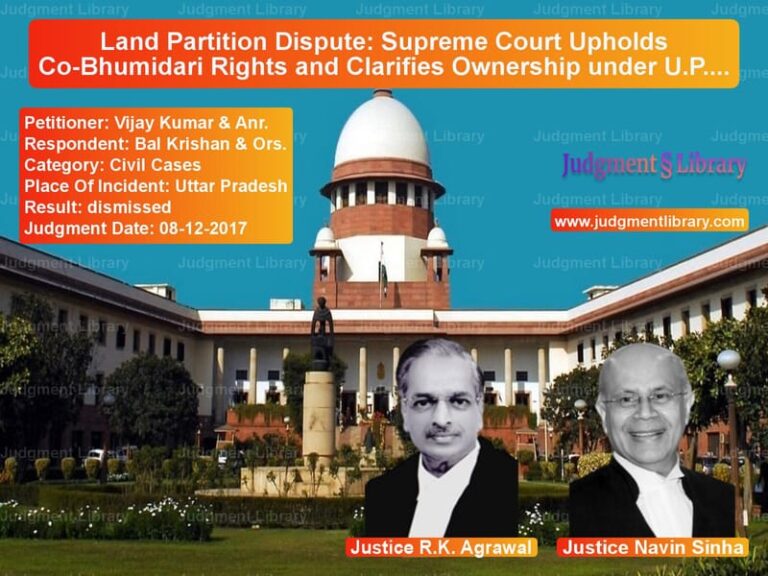Supreme Court Upholds Landlord’s Right to Evict Tenant Under UP Rent Control Act
On November 15, 2019, the Supreme Court of India delivered a significant ruling in the case of Santosh Chaturvedi vs. Kailash Chandra & Another, addressing a long-standing dispute over the eviction of a tenant under the Uttar Pradesh Urban Buildings (Regulation of Letting, Rent and Eviction) Act, 1972. The Court ruled in favor of the landlord, overturning the High Court’s judgment that had denied eviction, and reinstated the eviction order issued by the appellate authority.
Background of the Case
The dispute centered on a commercial property in Mathura, where the tenant had been conducting business for several decades. The appellant, Santosh Chaturvedi, sought eviction of the tenant, arguing that he required the premises for his own business under Section 21(1)(a) of the UP Rent Act. The tenant opposed the eviction, contending that the appellant lacked ownership rights and that the alleged bona fide need was not genuine.
The case went through multiple stages of litigation:
- The Prescribed Authority dismissed the eviction petition, ruling that the appellant was not the lawful owner of the property and that his need was not bona fide.
- The appellate authority reversed the decision, granting eviction while offering the tenant an alternative premises to mitigate hardship.
- The Allahabad High Court set aside the appellate authority’s decision, reinstating the Prescribed Authority’s ruling.
- Aggrieved by the High Court’s judgment, the landlord approached the Supreme Court.
Key Legal Issues
The Supreme Court examined two major legal questions:
- Whether the appellant was the legal owner and, therefore, entitled to seek eviction under the Rent Act.
- Whether the landlord’s claim of bona fide need was genuine and outweighed the tenant’s hardship.
Arguments of the Appellant (Santosh Chaturvedi)
The appellant contended that:
- The property was acquired through a family settlement, and he had legally succeeded as the owner.
- The tenant had recognized the appellant’s ownership by paying rent and requesting an alternative shop in prior proceedings.
- The appellate authority had properly examined the evidence and granted eviction while offering an alternative shop to balance hardships.
- The High Court erred in interfering with the factual findings of the appellate authority in a limited jurisdiction under Article 227 of the Constitution.
Arguments of the Respondent (Tenant)
The tenant countered that:
- The appellant was not a legal owner and could not seek eviction.
- The claim of bona fide need was concocted to evict the long-standing tenant.
- The proposed alternative shop was unsuitable for business.
- The High Court had rightly examined the ownership issue and found that the appellant failed to establish his title.
Supreme Court’s Observations
The Supreme Court critically analyzed the findings of all lower courts and made key observations:
1. Ownership and Landlord-Tenant Relationship
The Court held that ownership under the Rent Act is different from absolute ownership under property law. The judgment noted:
“In rent control proceedings, it is sufficient if the person seeking eviction has the right to receive rent and to occupy the premises for personal use.”
It ruled that the tenant had accepted the appellant as the landlord in prior proceedings, including a suit where rent was deposited in the appellant’s name.
2. Bona Fide Requirement of the Landlord
The Supreme Court held that the landlord’s need was genuine, stating:
“The appellant has established that he requires the premises for his own business, and there is no evidence to suggest that the claim is malafide or intended merely to evict the tenant.”
3. Role of the High Court in Revisional Jurisdiction
The Court criticized the High Court for re-examining factual findings in a writ petition under Article 227, ruling:
“The High Court erred in reassessing evidence and substituting its own views for those of the appellate authority, which is the final fact-finding body in rent matters.”
Final Judgment
The Supreme Court ruled in favor of the landlord and:
- Set aside the High Court’s judgment.
- Restored the appellate authority’s order granting eviction.
- Allowed the tenant three months to vacate the premises, subject to an undertaking.
Legal Implications of the Judgment
This ruling has significant implications for rent control laws in India:
- Recognition of landlord’s rights: A person collecting rent and using premises for business can be considered a landlord under rent control laws.
- Limited judicial review under Article 227: High Courts cannot re-examine factual findings of appellate authorities.
- Protection of bona fide claims: Landlords genuinely needing property for personal use can seek eviction without requiring absolute ownership.
- Hardship balance: Courts may order eviction while offering tenants alternative premises to mitigate hardship.
Conclusion
The Supreme Court’s ruling in Santosh Chaturvedi vs. Kailash Chandra reinforces the principle that bona fide requirements of landlords must be honored, provided they meet the legal definition of ownership. The decision upholds the appellate authority’s role as the final arbiter in rent matters and limits unwarranted High Court interventions. This judgment sets a precedent for future landlord-tenant disputes under rent control laws in India.
Petitioner Name: Santosh Chaturvedi.Respondent Name: Kailash Chandra & Another.Judgment By: Justice R. Banumathi, Justice A.S. Bopanna, Justice Hrishikesh Roy.Place Of Incident: Mathura, Uttar Pradesh.Judgment Date: 15-11-2019.
Don’t miss out on the full details! Download the complete judgment in PDF format below and gain valuable insights instantly!
Download Judgment: Santosh Chaturvedi vs Kailash Chandra & An Supreme Court of India Judgment Dated 15-11-2019.pdf
Direct Downlaod Judgment: Direct downlaod this Judgment
See all petitions in Landlord-Tenant Disputes
See all petitions in Property Disputes
See all petitions in Specific Performance
See all petitions in Judgment by R. Banumathi
See all petitions in Judgment by A. S. Bopanna
See all petitions in Judgment by Hrishikesh Roy
See all petitions in allowed
See all petitions in supreme court of India judgments November 2019
See all petitions in 2019 judgments
See all posts in Civil Cases Category
See all allowed petitions in Civil Cases Category
See all Dismissed petitions in Civil Cases Category
See all partially allowed petitions in Civil Cases Category







